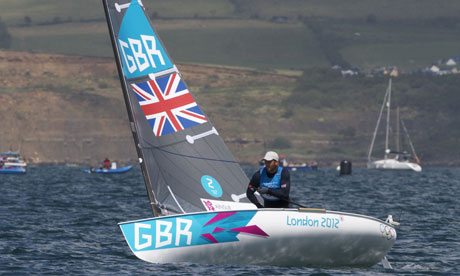
Introduction
"Port, Cuthbert, port! It's about to fall off the sideboard!" Geddit? Because port is a beverage and also the left-hand side of a boat, see. Haw haw. Jokes aside, this sport is no longer the preserve of deckshoe-clad sons of oligarchs – it's actually one of the Olympic events we excel in.
The basics
There's a bewildering array of types and sizes of boat you can sail in, from doing it all yourself in a one-man topper dinghy to being part of a team in a massive yacht. If you're a beginner, the vocabulary needed will start to come once you've been whacked on the head a couple of times by the boom because you've moved to port instead of starboard. If you find yourself taking a plunge in icy water and hear the words "Man overboard!" you're probably doing something wrong. Once you've got the basics down you can get involved in competitive sailing.
Health benefits
Hauling on ropes, dragging your boat and pushing and pulling the tiller improves core and arm strength, tones muscles and works the cardiovascular system. Sailing sharpens reactions, and co-operation skills are honed through team sailing. Being out on the open water, meanwhile, is supposed to boost serotonin levels and improve oxygen absorption.
Equipment, costs and practicalities
For starters, try contacting the local RYA (Royal Yachting Association) training centre, which you can find online. They'll offer taster courses so that you can get a feel for the kind of sailing you'd like to do. If you enjoy it, you might want to think about joining a club, where you'll be able to hire boats and equipment, talk to like-minded people and get involved with the competitive side of things should you wish. Again, this can be done through the RYA's online clubfinder.
Courses can be of different duration and vary a lot in cost. For example, at
London Dockland's Sailing and Watersports Centre a two-day beginner's dinghy course costs £170. At Outrun Sailing on Lake Windermere, a yacht can be booked for up to four people to do a course together for £450 per day.
Equipment including the boat, its trappings and safety equipment will be hired out by the club for beginners. You'll need to provide waterproofs yourself.
Trendiness rating: 5/10
If sailing mostly consisted of floating around the sunny Bahamas, drinking cocktails and diving off the boat, it'd have scored much higher. The reality is, you're likely to end up in a too-large lifejacket bobbing on grey lakewater desperately trying to turn over your capsized boat. It's fun, but not exactly "street".
Inside line
Susie Nation-Grainger, Royal Yachting Association: "Sailing has everything, from being a sociable relaxing experience to a high-adrenaline, high-action sport. Getting out on the water is becoming increasingly easy, with some 2,500 RYA recognised training centres based all over the world and some 1,500 RYA affiliated sailing clubs with the facilities you need to continue your sailing.
"The RYA's national and youth sailing schemes offer a series of two-day courses, starting at level one and progressing to level three, for anyone wanting to learn in dinghies, small keelboats or multihulls. Designed for beginners, these courses start by teaching basic skills to get you sailing independently in light winds and taking you right through to become confident sailing in stronger conditions."
Find out more
rya.org.uk – find clubs and courses near you through the Royal Yachting Association.
UK Sail – a national sailing directory.
You may also like
Canoeing, swimming (a must for beginners).
You might hate
Badminton, table tennis.
Over to you
Do you sail? Help us build up this resource by sharing tips, videos, links to clubs and anything else that beginners might find useful.

